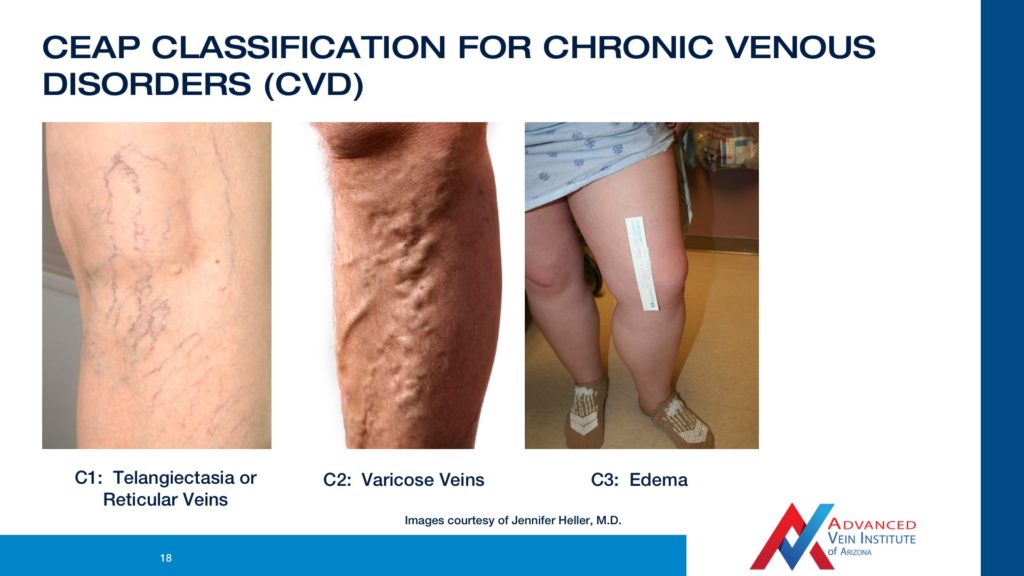VIDEO – The Causes of Vein Insufficiency
04 CVI The Causes of Vein Insufficiency from Tim C Martin on Vimeo.
If you have any questions or concerns about your vascular health, please schedule an appointment with Jilanne Rose at our Phoenix, Arizona office. With over 10,000 peripheral vein procedures to her credit, she is the Arizona Vein Specialist who can help you with any vascular concerns you may have.
And please share this with someone you care about!
VIDEO TRANSCRIPT
Factors of venous insufficiency:
The biggest and most prominent factor is genetics. Most people have a parent or grandparents that had bad veins and it passes on down the line. The onset of vein insufficiency in women is about the age of 35 and in men it’s a little older at 45.
Women and CVI
Things in women that can make chronic venous insufficiency worse: In pregnancy, with the increase in blood volume and hormonal shift, this increases the prevalence of the vein insufficiency and speeds up the time. The other thing that contributes to it is hormone replacement. When we first started replacing hormones in women we used to slam them with these huge doses of estrogen and progesterone. Those massive doses increased the incidence of vein insufficiency. It is not so prevalent now with the bioidentical hormones. They have dialed down birth control pills and that type of thing. So now, it is not as much of a factor but it certainly used to be.
Things such as smoking, hypertension, and obesity – a lot of those contribute to vascular compromise; however, usually most of those contribute more to the arterial type of disease.
Venous Insufficiency Causes?
So very briefly –what causes vein insufficiency? Essentially I like to relate it to stretching a rubber band out. You can stretch that rubber band out so many times and then you can’t make it regain its elasticity. That is very similar with veins.
Because of gravity and values that exist within these veins once they become weak and dilated the veins always remain stretched out. For that reason often times we get the symptoms we do. So if we are standing in a stationary position for a long period or if you are sitting for long periods of time, such as on long flights or long drives, the blood settles in pools in these weak veins and that is what causes swelling, night cramps, fatigue, heaviness, restless legs and numbness and tingling. Some people progress into itching, recurrent infections of the legs, and then eventually wounds if it progresses to that point.
This is one of the classifications that we use that are required to classify how significant veins are. The reticular veins are the ones you see on the surface of the skin, the little red wispy, almost spider vein-like eruptions.
The varicose veins are the larger ones that almost look like little ropes or cords under the surface of the skin.
Edema is a fancy word for swelling. A lot of people will get swelling around the ankles. If swelling gets real significant it just builds and progresses up the leg.
Pigmentation or eczema - a lot of times with chronic venous insufficiency, when that blood settles and pools in these veins, the skin starts to lose the nutrients it needs to stay healthy on the inside so that the body starts to try to protect its self. It starts to toughen up the skin and then the skin can turn brown. If you are pale or fair skinned, your skin turns a little bit darker. If you are darker complected sometimes it will actually turn black. It normally progresses and then you wind up with lipodermatosclerosis, another fancy term. The tissue starts to turn and break down and cause ulcers.

Congratulations, you are pregnant! Your bundle or bundles of joy are on the way to change your life forever! The body changes quickly during pregnancy, and some of these changes are not so wonderful! Varicose veins are a common occurrence in pregnancy. There are a number of reasons for this: blood volume increases, hormones shift,…
Read More- « Previous
- 1
- …
- 13
- 14
- 15

